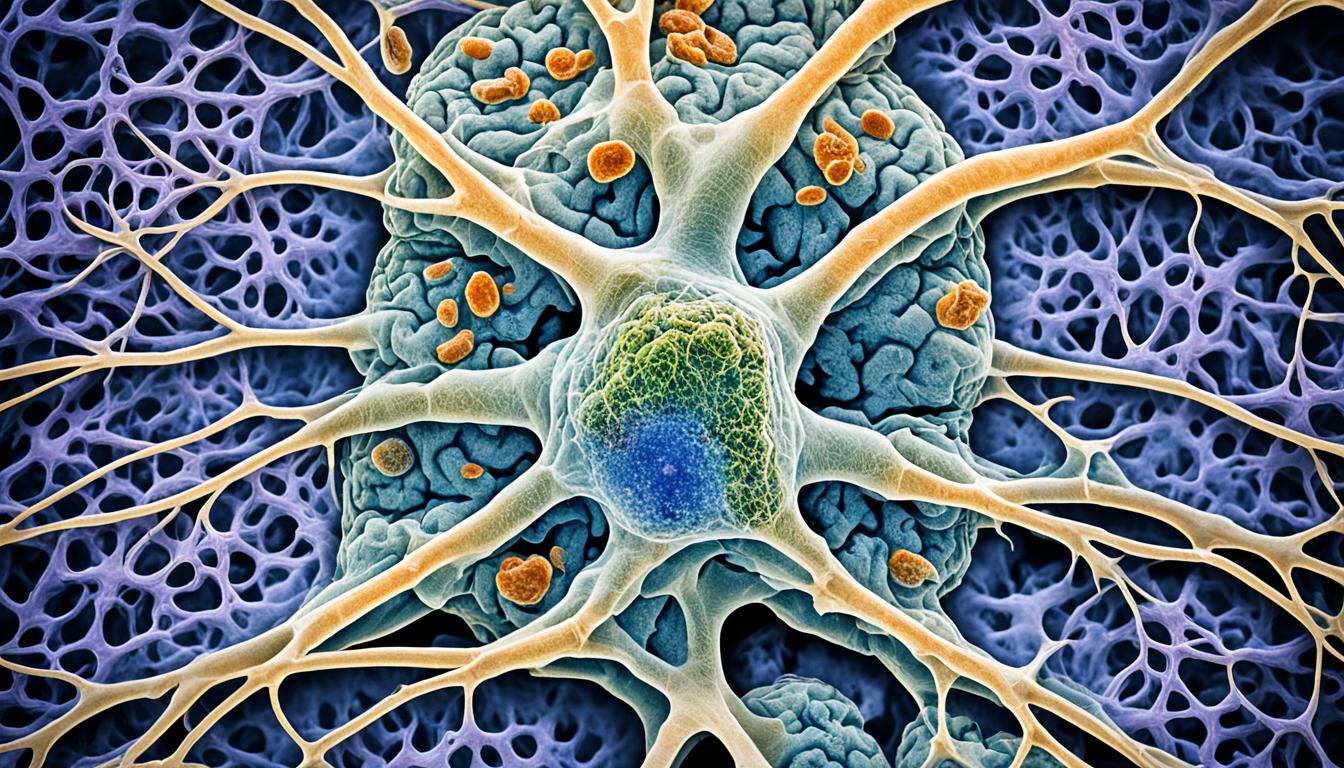Corticobasal degeneration, also known as corticobasal syndrome (CBS), is a rare brain condition. It causes certain parts of the brain to shrink. This leads to problems with how we move and think. Symptoms often start with movement problems on one or both sides of the body.
As the condition progresses, movement difficulties get worse. Other common signs are poor coordination, stiffness, and thinking issues. You might also find speaking or understanding language hard. Unfortunately, the disease can lead to more severe problems like trouble walking, blood clots, and pneumonia.
Doctors are not yet sure why corticobasal degeneration happens. It seems to involve a protein called tau. While we don’t know specific risk factors, anyone can get the disease. Currently, there is no cure. But, scientists are looking into using stem cells to treat it.
Key Takeaways:
- Corticobasal degeneration is a rare neurological disorder characterized by the shrinkage of certain areas of the brain.
- Symptoms include difficulty with movement, poor coordination, stiffness, trouble thinking, and speech or language difficulties.
- The exact cause is not fully understood, but it is believed to involve the buildup of a protein called tau in the brain cells.
- There are no known risk factors for corticobasal degeneration, and it can lead to serious complications.
- Stem cell therapy shows promise as a potential treatment option.
Symptoms and Diagnosis of Corticobasal Degeneration
Corticobasal degeneration brings on many symptoms that greatly affect daily life. People might find it hard to move on one or both sides of their body. They might also have poor coordination and trouble keeping balance. Stiffness, muscle jerks, and difficulties swallowing are common. Eye movements and thinking or language skills can change too. Some might speak slowly and have a hard time finishing sentences.
The impact of corticobasal degeneration can vary, worsening over time. Symptoms become more severe as the disease progresses. Typically, it lasts 6 to 8 years, making moving and functioning hard.
Diagnosing it can be tough due to symptom overlaps with other conditions. A detailed patient history and physical exam are crucial. Doctors may use imaging tests like MRI to look for brain changes specific to this condition.
A definite diagnosis, though, can only be made by examining the brain after death. It’s surprising that fewer than half of diagnosed people are confirmed to have it post-mortem. This shows the diagnosis difficulty in the medical field.
Symptoms of Corticobasal Degeneration
| Symptoms |
|---|
| Trouble moving on one or both sides of the body |
| Poor coordination |
| Trouble with balance |
| Stiffness |
| Muscle jerks |
| Trouble swallowing |
| Changes in eye movements |
| Trouble with thinking and language skills |
| Slow and halting speech |
If you or someone you know has these symptoms, it’s important to see a doctor. A comprehensive examination is necessary to confirm corticobasal degeneration and start proper treatment.
Treatment and Stem Cell Therapy for Corticobasal Degeneration
There is no cure yet for corticobasal degeneration. But, treatments can help manage symptoms. They also aim to improve life quality for those with the condition.
Doctors may suggest using medications like donepezil, rivastigmine, and galantamine. These drugs are cholinesterase inhibitors. They tackle the memory issues linked to corticobasal degeneration.
Other cases might need medications for Parkinson’s. These include levodopa or carbidopa. Still, their benefit for corticobasal degeneration isn’t certain.
Stem cell therapy offers a new hope. It is a method showing promise for diseases like corticobasal degeneration. Stem cells can turn into many cell types. They might help repair brain tissues. Though it’s early, research supports it as a potential future treatment.

